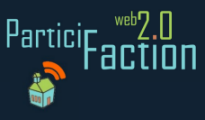I think that, at some point in the past, "do as I say, not as I do" used to go a long way with kids. Today, not so much. One of the problems with teachers expecting technology-based presentations or products from students today is that the teachers themselves know little about how to use the technology. Teachers tell students to deliver a PowerPoint presentation, but the teachers don't themselves know how to connect a data projector to a laptop; they mark student websites without ever having created a site themselves. Is this "do as I say, but it's not what I know how to do?" Should we expect (or assess!) something that we ourselves have never accomplished?
We are asked to model a lot of things as teachers: appropriate dress, behaviour, communication, etc. Like it or not, this expectation extends well beyond the school walls and the school day, too: I'm still expected to "be a teacher" at the mall or at my kid's soccer practice -- I'm still a teacher at the local bar on a Saturday night. If such weight is given to my modeling, then should I not model the fact that I am a lifelong learner, too? Wouldn't that be a more positive influence on these impressionable young'ns than the fact that I'm in Dockers instead of jeans?
Students need to know that teachers are learners. In order for that to happen, however, two other things need to happen first: (1) teachers actually need to be learners, and (2) teachers need to be "transparent" in their learning. Will Richardson, and some of his followers, see this transparency as essential in contemporary leadership.
There are lots of reasons for teachers to resist learning, ranging from "I'd love to but I don't have time" to "courses are expensive" to "I don't need to learn anything new to do what I've always done." None of these reasons, however, touch the fact that, as teachers, it is our job to best prepare our students for their likely futures. In order to do our jobs at this point in history, then, we need to have experienced, as "learning teachers," the world of web 2.0. We can't prepare kids for the future without knowing about (and teaching) appropriate use of the tools of the present. I think that, actually, most schools are trying to prepare kids for the future using the tools of the past: it's comfortable for teachers, but not helping the students much.
If a teacher decides to be a learner, then that teacher's learning needs to be seen by the student. We encourage students to take chances and make mistakes, but are rarely willing to expose ourselves as trying and failing; teachers prefer to enter the room as the authority figure. Some complain about a lack of respect for that presumed authority, but perhaps if we portrayed ourselves as possessing the human trait (gasp!) of being learners who make mistakes sometimes, then our students could relate to us a little better; maybe even respect us more... at least we'd get props for our street cred, if you know what I mean.
Wednesday, April 8, 2009
Subscribe to:
Post Comments (Atom)




1 comment:
Great points in terms of modeling just about everything else we do for students/kids. Why should our learning be any different? Thanks for reading. Will
Post a Comment